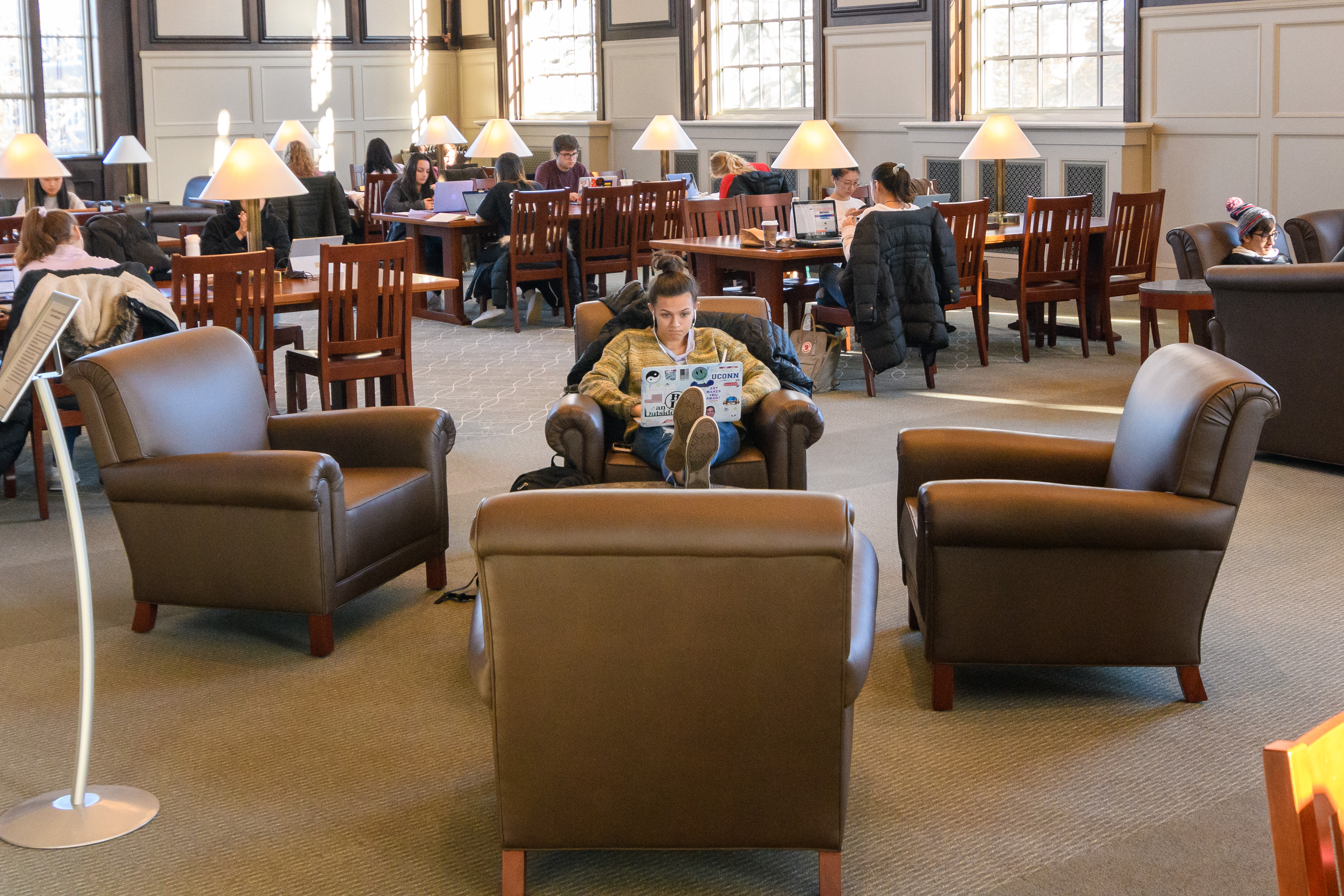One of every four UConn Storrs undergraduates and half of those at its regional campuses represent the first generation in their immediate family to attend a four-year college in pursuit of a bachelor’s degree. Now, UConn’s success in helping that unique cohort of students adjust and thrive is being recognized at a national level.
UConn this year was invited to join the ranks of First-gen Forward program honorees, a program of the Washington, D.C.-based Center for First-Generation Student Success.
The First-gen Forward designation recognizes UConn as an institution that shows particular success and dedication in supporting first-generation students, including through evidence-based practices and resources to bolster recruitment, retention, and graduation.
As one of the selected institutions, UConn will have access to additional professional development, community-building experiences, and a first look at the center’s research and resources.
The honor came this spring, just before UConn and other universities nationwide started finding themselves challenged by the COVID-19 pandemic to develop innovative ways to remain connected with students – both first-gen undergrads and their peers – who are studying remotely.
With its program already well-rooted in making personal connections, UConn went into the new phase of remote learning and services ready to assist many of its first-gen students facing a wide range of challenges.
UConn officials have already worked with many students individually to help them with the transition. They’ve offered guidance on everything from accessing technology at homes to understanding their fall financial aid packages and accessing career services if they are among UConn’s approximately 1,300 first-generation seniors slated to graduate this weekend.
About one-quarter of UConn Storrs undergraduate students report they are the first generation in their family to attend college, while more than 50 percent of students at the regional campuses in Hartford, Stamford, Waterbury, and Avery Point are also first-generation students.
UConn has integrated formal and informal services toward first-generation students across campus offices, led by the First-Year Programs / Learning Communities (FYP&LC) office and the Institute for Student Success.
Leo Lachut, Director of Academic Support, spearheads efforts that span a wide range of initiatives, including many behind-the-scenes collaborations with other UConn offices to help the students with issues such as academic advising, understanding financial aid, finding appropriate work-study opportunities, networking, and career preparation.
The University also works closely with the students to help them navigate complex areas of college life and build community with each other, including a reception on move-in day for them and their families and a FAFSA party to help them complete the Free Application for Federal Student Aid.
UConn also presents a programs each November celebrating National First-Gen Day and offers an on-campus student organization in which first-generation students can meet and support each other. Over 300 first-generation faculty and staff have formed a group which meets regularly to craft outreach and new initiatives, and who serve as mentors and examples to first-generation students.
UConn Board of Trustees Chairman Dan Toscano, who along with his three siblings were their family’s first generation to attend college, said he still recalls his earliest days as a UConn student adjusting to the new rhythms and requirements of university life while counting every penny.
He said serving first-generation students isn’t only about meeting their academic needs; many also come with financial constraints and the mental health pressures that can create.
“For people coming into a situation like this as first-generation students, college can feel very intimidating,” Toscano says. “I think that over time, there’s been a broader realization in universities that first-gen students may face issues that other students don’t, and it’s important for institutions like UConn to try to predict and address them.”
For UConn to be honored at a national level for its service to first-generation students is particularly meaningful, he says: “It speaks to a level of engagement and awareness at UConn, and recognizes that the University is working to get ahead of these issues and help our students right from the beginning.”
As a recipient of the new First-gen Forward Institution designation, select UConn faculty and staff will be offered multiple opportunities to engage with peer and aspirational institutions who are also creating environments that improve the experiences and outcomes of first-generation students.
UConn will also be invited to send representatives to the organization’s workshops and participate in monthly phone calls, virtual professional development, goal setting, blog development, annual reporting, and more.
“First-gen Forward is an exciting opportunity for the University of Connecticut to join an elite community of professionals prepared to share evidence-based practices and resources, troubleshoot challenges, generate knowledge, and continue to advance the success of first-generation students across the country,” says Dr. Kevin Kruger, NASPA’s president and CEO.
“We are excited to see a groundswell of activity from the First-gen Forward cohort and know UConn will be a significant contributor,” he says.



